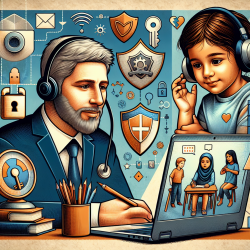The COVID-19 pandemic has been a challenging period for many families, particularly those with children diagnosed with Autism Spectrum Disorder (ASD). A recent study titled "Autism spectrum disorder, parent coping, and parent concerns during the COVID-19 pandemic" (Fatehi, Fatehi, & Mowbray, 2023) provides valuable insights into the difficulties faced by these families and offers actionable data for practitioners. Here’s how you can leverage these findings to improve your practice and support your clients better.
Understanding the Impact on Families
The study highlights several key areas where families with ASD children faced significant challenges:
- Access to Services: During the pandemic, many children lost access to in-person therapeutic services such as Applied Behavior Analysis (ABA), speech therapy, and occupational therapy. Although telehealth services were available, their effectiveness was rated as average by parents.
- Remote Learning: Only a small percentage of children received full-day remote learning services. Most had limited interaction with teachers and required constant monitoring, which added to the parents' stress.
- Daily Routines: Parents found it challenging to establish and maintain routines at home. Many children spent more time on passive activities like watching TV or playing video games, which could affect their overall development.
- Parental Stress: The study found that parents experienced heightened stress and anxiety levels, exacerbated by the pandemic. Many reported increased alcohol consumption and a lack of time for self-care.
Actionable Steps for Practitioners
Based on these findings, here are some strategies that practitioners can implement to support families better:
1. Enhance Telehealth Services
While telehealth services were available, their effectiveness was rated as average. Practitioners should focus on enhancing the quality of these services by:
- Providing additional training for telehealth delivery to ensure high-quality interactions.
- Offering flexible scheduling to accommodate families' varying needs.
- Incorporating more interactive elements to engage children better.
2. Support Remote Learning
Given the limited effectiveness of remote learning, practitioners can assist by:
- Collaborating with schools to develop more effective remote learning plans tailored to the needs of children with ASD.
- Offering resources and strategies to parents for monitoring and supporting their children's learning at home.
3. Establish Routines and Activities
To help families establish and maintain routines, practitioners can:
- Provide parents with structured daily schedules that include both active and passive activities.
- Recommend specific activities that promote physical and cognitive engagement, such as outdoor play, exercise, and educational games.
4. Address Parental Stress
To alleviate parental stress, practitioners should:
- Encourage parents to join support groups, either online or in-person, to share experiences and coping strategies.
- Offer counseling services to help parents manage stress and anxiety.
- Provide resources for self-care and stress management techniques.
Encouraging Further Research
The study underscores the need for ongoing research to better understand the long-term impacts of the pandemic on families with ASD children. Practitioners should stay informed about the latest research and incorporate new findings into their practice. Additionally, collaborating with researchers to contribute data and insights can help shape more effective interventions in the future.
To read the original research paper, please follow this link: Autism spectrum disorder, parent coping, and parent concerns during the COVID-19 pandemic.










